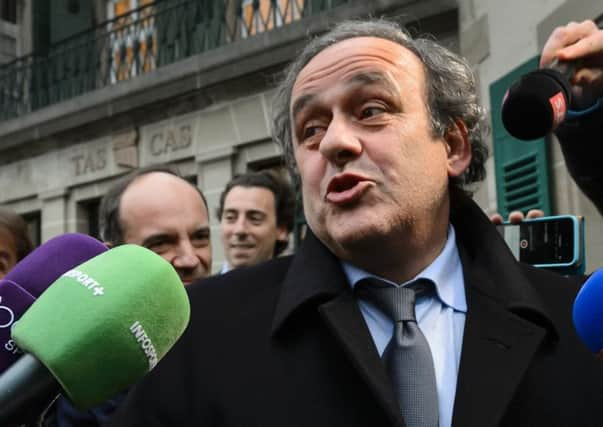Uefa says Platini can be '˜very proud' of money-making Euros


Uefa’s projected tournament finances published yesterday showed total revenue of €1.93 billion for the expanded 24-team tournament. “The numbers are positive,” Uefa interim general secretary Theodore Theodoridis said at a news conference, adding that a larger event “was a big success”.
Revenue is forecast to rise by 34 per cent – earned from 20 extra matches – over Euro 2012, which had 16 teams and 31 matches played in Poland and Ukraine. Four years ago, Uefa’s profit was €593.7 million from its most lucrative competition, according to its financial accounts for that year.
Advertisement
Hide AdAdvertisement
Hide AdUefa leaders, including Theodoridis and senior vice president Angel Maria Villar, praised Michel Platini, the European football body’s outgoing president who will serve a Fifa ban from official duty until 2019. Platini’s pledge to add eight more teams to the tournament was key to him being elected in 2007, and he worked in 2010 with Nicolas Sarkozy, then president of France, to help its hosting bid beat Turkey in a 7-6 vote of Uefa executive committee members.
“France’s hosting of Uefa Euro 2016 is down to one man: Michel Platini,” Villar said at the briefing at Stade de France, where the home nation play Portugal in the final tomorrow night. “Michel can be proud, very proud, of his Euro.”
Still, Uefa does not expect Platini to accept its invitation to attend the match.
Platini’s tournament legacy includes letting Uefa bank €230 million from Euro 2016 to cover its own running costs for the next four years.
Uefa’s profit will also provide €600 million for its 55 member federations for development projects over the next four years.
The money was earned by: broadcast rights of just over €1 billion; sponsorship and licensing deals worth €480 million; and sales of tickets and hospitality earning €400 million.
Spending by Uefa on Euro 2016 included €650 million on organising the event; €301 million in team prize money; and €150 million to clubs for releasing their players to the finals tournament and qualifying matches.
Uefa can, of course, now point to its financial results as an argument for keeping the 24-team format beyond Euro 2020, despite criticism that the quality of football has declined. It will also point to the success and excitement surrounding surprise semi-finalists Wales and quarter-finalists Iceland.